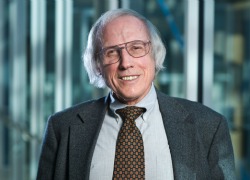About Us
 Chair's Message
Chair's Message
Our Department of Biochemistry is at the forefront in pursuit of regulatory mechanisms and in meeting the challenge of clinical applications. We are making valued and recognized contributions that are aligned with the shared complementary visions of the College of Medicine, the University and our clinical partner, The University of Vermont Medical Center in biomedical investigation, education and service.
Our faculty, students and fellows are providing paradigm-shifting advances at the cutting edge of science and medicine. We embrace a culture of transdisciplinary partnerships that transcend traditional boundaries in undergraduate, graduate and medical teaching and in pursuit of research through collaborative team approaches that combine biochemical, molecular, cellular, in vivo genetic, epigenetic, genomic, spatial transcriptomic, proteomic, and bioinformatic strategies. Emphasis is on multiomic and multispectral imaging the pursuit of regulatory mechanisms in the context of translation to resolution of clinically relevant problems. The Department of Biochemistry research infinitives are reinforced by collaborations with colleagues throughout the University of Vermont, the Vermont Department of Health, and with colleagues in Europe, Asia, South America, and in the Middle East as well as by partnerships with scientists and physician investigators at the National Cancer Institute. Engagement in service and outreach to the University, the community and beyond is a priority for the Biochemistry faculty, students and staff.
There has been extraordinary progress in establishing new frontiers in understanding genetic and epigenetic parameters of cell structure-gene expression interrelationships that control proliferation and differentiation during mammalian development, the phenotypic properties of specialized cells and tissues, and alterations occurring in human disease. Major advances have been made in cell cycle control, regulation of proliferation and tissue-specific gene expression by hormones and growth factors, dynamics and control of chromatin remodeling, intra-nuclear organization and assembly of regulatory machinery, and elucidation of multiple signaling pathways and gene regulatory histone order chromatin structures that transduce and integrate regulatory inflammation within cells and tissues. We are establishing a roadmap of control that translates to breakthroughs in the diagnosis and treatment of human diseases that include cancer, musculoskeletal disorders, neurological disorders, hematologic disorders, and cardiovascular disease.
Increased and expanded capabilities through recruitment of well-credentialed faculty, undergraduate, graduate, and medical students and postdoctoral/clinical fellows have positioned our Department of Biochemistry to make transformative advances in the biology and treatment of cancer, musculoskeletal disorders, and cardiovascular disease. Partnerships of our Biochemistry scientists with physician investigators have identified molecular defects in cancer cells that: identify regulatory pathways that govern cell cycle control to selectively target tumors; inhibit tumor vascularization as a pivotal strategy to contain tumors; prevent breast and prostate cancer metastasis to bone; discover non-coding RNAs that are obligatory for the onset and progression of cancer and establish epigenetic signatures for risk assessment and treatment of solid tumors and leukemias. Equally relevant, our prominent coagulation/cardiovascular investigators have made pivotal discoveries in regulatory networks that are critical for the biology and pathologies of clotting.
The Biochemistry Department is committed to excellence in undergraduate, graduate, postgraduate and medical education. Our graduates have secured academic and clinical positions, as well as positions in the biotechnology and pharmaceutical industries, where they provide valuable insight into the multiple dimensions of biochemical control and human disease.
Our Department of Biochemistry is dedicated to excellence in research, graduate education, and medical education. We are committed to a collegial, collaborative environment with maximal opportunity for junior and senior colleagues to successfully resolve complex biological problems and support the career development of the next generation of scientists, physician/investigators, and educators. The Department of Biochemistry has long-standing and extensive commitment to global health.
Outreach and community engagement initiatives of the Biochemistry Department are a priority and include active participation in K-12 science education and advocacy for health care. Biochemistry faculty serve on and chair NIH study sections and are members of scientific advisory boards for funding agencies, foundations, biomedical/pharmaceutical companies in the United States and abroad. A distinction in biomedical research is reflected by high impact, peer-reviewed research papers, extramural funding for research programs from NIH and the private sector, invited presentations at major national and international meetings, and recognition for excellence in mentorship.
Gary Stein, Ph.D.
Perelman Professor and Chair of Biochemistry
Distinguished University Professor